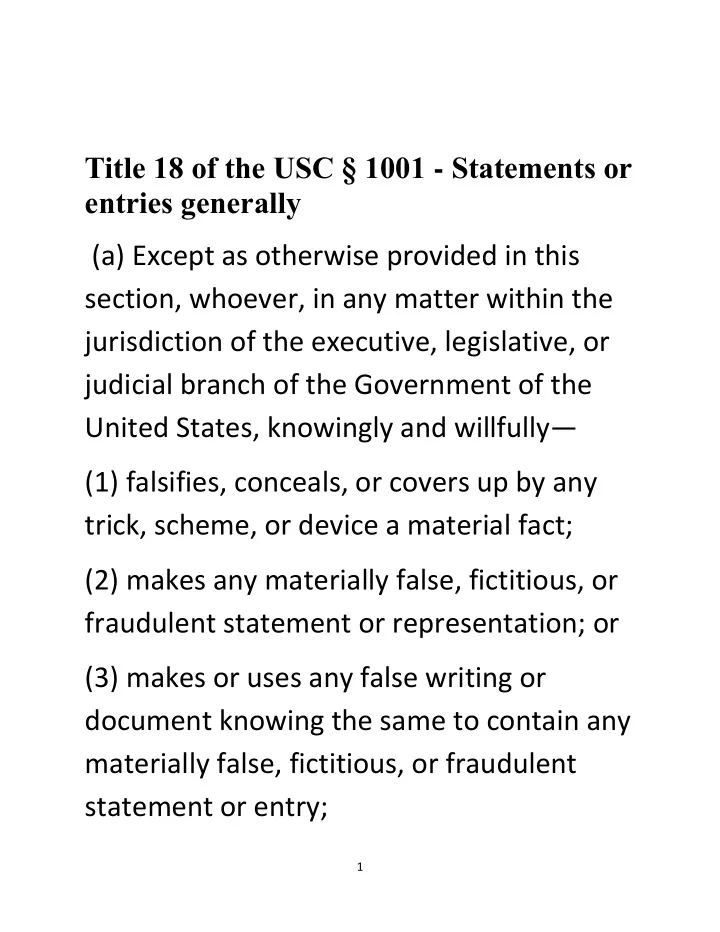

Title 18 of the USC § 1001 - Statements or entries generally (a) Except as otherwise provided in this section, whoever, in any matter within the jurisdiction of the executive, legislative, or judicial branch of the Government of the United States, knowingly and willfully — (1) falsifies, conceals, or covers up by any trick, scheme, or device a material fact; (2) makes any materially false, fictitious, or fraudulent statement or representation; or (3) makes or uses any false writing or document knowing the same to contain any materially false, fictitious, or fraudulent statement or entry; 1
shall be fined under this title, imprisoned not more than 5 years or, if the offense involves international or domestic terrorism (as defined in section 2331), imprisoned not more than 8 years, or both. If the matter relates to an offense under chapter 109A, 109B, 110, or 117, or section 1591, then the term of imprisonment imposed under this section shall be not more than 8 years. (b) Subsection (a) does not apply to a party to a judicial proceeding, or that party’s counsel, for statements, representations, writings or documents submitted by such party or counsel to a judge or magistrate in that proceeding. 2
(c) With respect to any matter within the jurisdiction of the legislative branch, subsection (a) shall apply only to — (1) administrative matters, including a claim for payment, a matter related to the procurement of property or services, personnel or employment practices, or support services, or a document required by law, rule, or regulation to be submitted to the Congress or any office or officer within the legislative branch; or (2) any investigation or review, conducted pursuant to the authority of any committee, subcommittee, commission or office of the Congress, consistent with applicable rules of the House or Senate. 3
Title 28 U.S.C. §1746 Wherever, under any law of the United States or under any rule, regulation, order, or requirement made pursuant to law, any matter is required or permitted to be supported, evidenced, established, or proved by the sworn declaration, verification, certificate, statement, oath, or affidavit, in writing of the person making the same (other than a deposition, or an oath of office, or an oath required to be taken before a specified official other than a notary public), such matter may, with like force and effect, be supported, evidenced, established, or proved by the unsworn declaration, certificate, verification, or statement, in writing of such person which is subscribed by him, as true under penalty of perjury, and dated, in substantially the following form: (1) If executed without the United States: “I declare (or certify, verify, or state) under penalty of perjury under the laws of the United States of America that the foregoing is true and correct. Executed on (date). (Signature)”. (2) If executed within the United States, its territories, possessions, or commonwealths: “I declare (or certify, verify, or state) under penalty of perjury that the foregoing is true and correct. Executed on (date). (Signature)”.
The Hague Convention Abolishing the Requirement for Legalisation for Foreign Public Documents , the Apostille convention , or the Apostille treaty is an international treaty drafted by the Hague Conference on Private International Law. It specifies the modalities through which a document issued in one of the signatory countries can be certified for legal purposes in all the other signatory states. Such a certification is called an apostille (French: certification ) Procedure Apostilles are affixed by Competent Authorities designated by the government of a state which is party to the convention. 1
A list of these authorities is maintained by the Hague Conference on Private International Law. Examples of designated authorities are embassies, ministries, courts or (local) governments. For example, in the United States, the Secretary of State of each state and his or her deputies are usually competent authorities. In the United Kingdom, all apostilles are issued by the Foreign and Commonwealth Office 2
To be eligible for an apostille, a document must first be issued or certified by an officer recognised by the authority that will issue the apostille. For example, in the US state of Vermont, the Secretary of State maintains specimen signatures of all notaries public, so documents that have been notarised are eligible for apostilles. Likewise, courts in the Netherlands are eligible of placing an apostille on all municipal civil status documents directly. In some cases, intermediate certifications may be required in the country where the 3
document originates before it will be eligible for an apostille. For example, in New York City, the Office of Vital Records (which issues, among other things, birth certificates) is not directly recognised by the New York Secretary of State. As a consequence, the signature of the City Clerk must be certified by the County Clerk of New York County to make the birth certificate eligible for an apostille. In Japan all the official documents are issued in Japanese language, Ministry of Foreign Affairs (MOFA, JAPAN) then provides an apostille for these documents. 4
Special thanks to Deborah Joyce for providing this example of an Apostille iPOSTILLE (Convention de La Haye du 5 Octobre 1961) 1. Country: United States of America This public document has been signed by Lois M. Meeteer 3. acting in the capacity of Deputy State Registrar, Division of Vital Records, Richmond, Virginia 4. bears the seal/stamp of The Virginia Department of Health Certified 6. This 2nd day of January, 2002 5. at Richmond, Virginia � 7. by the Secretary of the Commonwealth of Virginia L._ 8. No. 42849 10. Signature: 9. Seal/Stamp: � __Cbut_e_ OttrA4L Secretary of the Commonwealth
Recommend
More recommend